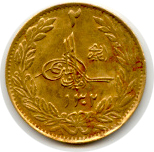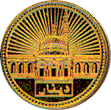 THE GOLD DINAR RESEARCH GROUP
THE GOLD DINAR RESEARCH GROUP 
|
|
|
|
Universiti
Sains Malaysia, Penang
|
About Us | Members | Activities | Articles | Photo Gallery | The Dinar | Zakat | Mahr | Dinar Trade Network| Bookshop | Links | Announcements | Contact Us
|
|
|
ANNOUNCEMENT |
|||||||
|
New book by Shaykh 'Abdalqadir As-Sufi |
|||||||
|
MADINAH PRESS ISBN: 0-620-29054-5 www.madinahmedia.com
|
|||||||
|
Book Review This new book by Shaykh Abdalqadir is unequivocal in its placing the Deen of Islam and the Muslims who hold to it as being over and above the collapsed and failed ethos of kufr. From its first sentence the author reverts the whole affair back to Allah. Chapter One gives us an understanding of deen from its root of 'dal-alif-nun, daana, which means to be indebted and also to judge.' This debt begins with a loan from Allah and we spend from it out of the life He gave us, and then He, subhannahu wa ta 'ala, repays us for it. On the Day of the Deen all debts fall due. This is also called the Last Day. The Shaykh next explains the Command of Allah, 'kun fa yakun' (BE AND IT IS) and then unfolds the most beautiful and intellectually sublime description of Rububiya, 'the inter-linked and inter-connected pattern which runs through all creation.' The Great Question that was asked: Alastu bi rabbikum (Am I not your Lord?), and then was answered, originated from before time yet is confirmed or denied in the lived-out in-time reality of each and every human soul that all said "Yes." Those that confirm their answer and those who cover over (make kufr of) what they answered now stand on two opposing 'sides of an abyss.' On one side are the muminun, on the other the kafirun. The Second Chapter is Dawla, a unique and very special term for the Islamic polity, which does not mean State, as understood within the dominant world view of kufr and has been accepted by the unfortunate Islamic Modernists. The word dawla, the Shaykh informs us, derives from the root dal-alif-lam, and means to change periodically, to take turns, to alternate and to rotate. This is a 'movement' that creates a recognisable pattern that is the deen of Islam. This patterning is expressed through the movement of wealth that occurs through trade (from which usury is prohibited), through the distribution of Zakat (that has been taken by authority before it is released to those to whom it is due), and lastly by means of booty, ghanam, that is the permitted wealth of those who go out and strive in the 'way of Allah.' Again relating to the internal flow of wealth is the jiziya, taken from the Dhimmis in exchange for their being protected, choosing to live within a Muslim society. Before going to the next chapter it is useful to draw attention to the previous book written by the Shaykh, Technique of the Coup De Banque, which so clearly demonstrates the 'machine' quality of the modern State and how it is inimical to the nature of Dawla. The fiscal State runs on the fuel supply of riba and has a power nexus or engine, which is Bankism, that operates outside of democratically elected Government. The function of Government, therefore, remains only as an inter-face between the non-elected elite, what can be identified as a financial oligarchy, and the general public. The model of Dawla given us in Sultaniya is exemplified by movement, change and distribution, and is the diametrical alternative to the kafir State system, whose underlining characteristic would be 'hoarding' through the concentration of wealth and assumed power amongst a non-elected elite. The next chapter, which is on Waqf, is written by Professor Mehmet Maksudoglu, the author of Osmanli History 1289-1922, and a leading authority in the field of Ottoman studies. The role of the waqaf (a charitable trust set up in perpetuity for providing a specific service or benefit) within the Islamic model is essentially one of an energy source (derived from seeking the Pleasure of Allah) for the growth, prosperity and the taking care of the basic welfare of society. The fourth chapter is provided by Umar Ibrahim Vadillo, the leading alim (scholar) in the world today on Islamic Trade. Mr.Vadillo is a scholar of the fiqh (the science of the application of Shar'ia) and Sunna (confirmed practice) of the Rasool, may Allah bless him and grant him peace, pertaining to tijara (trade), and, furthermore, is a demention of Islam that has been allowed to atrophy for over a century. Significantly, this important alim fully understand the complex machinations of usury Capitalism (modern economics) as it operates in our present time, and not only deconstructs the myth of false [fiat] money but outlines the means of re-establishing halal trade with the Islamic Gold Dinar and Silver Dirham, Islamic Contracts, Open Markets and the Caravans of the twenty-first century. Halal must be taken to mean lawful (by Divine Law) and healthy in regards to a commercial intercourse that produces equity and shared benefit. The author of this essential chapter clearly distinguishes between a pseudo-scholarship that has attempted to Islamisise a kafir economic system and authentic Madinan Islam based on the amal of the community of the Prophet Muhammad, may Allah bless him and grant him peace. In Chapter Five, As Sultan, Shaykh Abdalqadir begins with the sobering statement that 'there is no extant Islam on the face of the planet,' and while there are probably as many as two billion Muslims there is 'no Islamic command.' The author provides an historical breakdown of events starting with the rule of Mahmud II in the first years of the nineteenth century and ends in the first years of the twentieth with the Kamalist secular (read kafir) State. The chronology is the record of the dismantling of the Deen, as piece by piece it is surrendered in order to accept in its place another deen. The last heroic effort to divert the entropy of collapse was made by Sultan Abdalhamid II, until the Islamic command stopped. This chapter is by far the most challenging to the hollow religion of Humanism, as it deals with Personal Rule, Genetic Inheritance and Qur'anic Revelation. The sixth and final chapter, Tasawwuf, provides both a précis to the two main formulations that make up the previous chapters as well as adding an essential third one. The first formulation would be the validity of 'the practiced science of heredity,' based on the Shari'at, relating to inheritance and includes 'personal rule, kingship and for us [most] crucially Kalifate.' The second formulation is that of 'a sound currency, that is the Zakat-collectable Islamic Gold Dinar and Silver Dirham.' The third formulation is neither a political program nor a personal one. It is nothing less than the returning of the whole of the Deen of Islam to that of being a Divine matter. The 'final conclusion is that where there is a terrain governed by Amirs who have Sultaniyya in the matters of the Faara'id,' the 'Great Moment' can arrive where men choose the 'noblest and bravest amongst them' to lead the Muslims. An insight into who these leaders were who ruled in this manner can be glimpsed by recognising that they all had spiritual Shaykhs who guided them in their inward as they lead the Umma in strengthening and expanding the Deen. There the text ends, with the passing on of authority from Allah, first to the Rasool, may Allah bless him and grant him peace, and then to those who followed in command, with Allah's words from Al A'raf: "Say, Mankind! I am Messenger of Allah to you all." Abdullah Luongo
Contacts for information and books by Shaykh Abdalqadir as-Sufi: Orhan Gazi, Amir in Cape Town of the Murabitun Abdurrahman Shabalala: 083 673 7871 (PRESS SECRETARY)
|
|||||||
Last Updated: 10/01/03 ©NorizanEsa2003